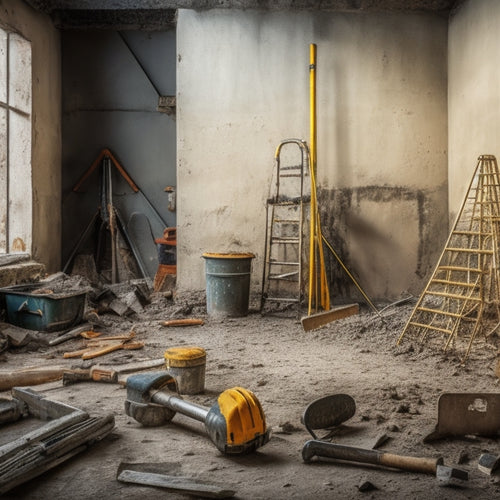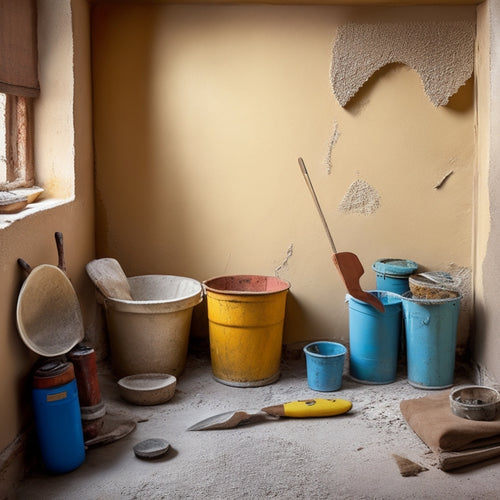
Why Do Cinder Block Wall Renovations Cost So Much
Share
You're likely surprised by the high cost estimate for your cinder block wall renovation project, but it's driven by several factors. Demolition and debris removal costs, including waste disposal fees and potential recycling options, add up quickly. Material and labor expenses, influenced by quality and availability, also impact your budget. Additionally, structural integrity assessments, permit and inspection fees, and unforeseen site condition charges - which can account for up to 20% of the project cost - all contribute to the total bill. Understanding these complex factors is essential for accurately estimating your project's expenses, and there's more to take into account in getting an accurate estimate.
Key Takeaways
- Demolition and debris removal costs for cinder block walls can range from $2 to $5 per square foot, depending on location and waste type.
- Material and labor expenses are influenced by factors like material quality, labor availability, and accurate quantity calculations, which can significantly impact overall costs.
- Structural integrity assessments are crucial to identify weaknesses in the wall, ensuring foundation stability and load-bearing capacity, and may involve visual inspections, material testing, and simulations.
- Permit and inspection fees, including building, electrical, and zoning permits, can add to the overall cost, and failure to obtain them can result in costly rework or fines.
- Unforeseen site conditions, such as hidden damage or structural issues, can lead to unexpected expenses, making a contingency fund essential to maintain project flow.
Demolition and Debris Removal Costs
You'll need to factor in demolition and debris removal costs when calculating the total expense of your cinder block wall renovation.
Demolition costs vary depending on the size of the wall, its condition, and the required permits. On average, you can expect to pay between $2 and $5 per square foot for demolition services.
Additionally, you'll need to take into account waste disposal fees, which can range from $50 to $150 per ton, depending on your location and the type of waste.
It's essential to explore recycling options to reduce waste disposal costs.
Many companies offer recycling services for concrete and masonry materials, which can be reused as aggregate or fill material. This not only reduces waste but also helps minimize the environmental impact of your renovation.
Be sure to research local recycling facilities and waste management companies to find the most cost-effective and eco-friendly solutions for your project.
Material and Labor Expenses
With material and labor expenses comprising a considerable portion of your cinder block wall renovation costs, it's crucial to accurately estimate these expenditures to avoid budget overruns.
You'll need to take into account the quality of materials required for your project. The cost of cinder blocks, mortar, and other materials can vary greatly depending on the quality and brand you choose. Additionally, labor costs will be impacted by the availability of skilled workers in your area.
Some key factors to keep in mind when estimating material and labor expenses include:
-
Material quality: high-quality materials may be more expensive upfront, but they'll last longer and require less maintenance.
-
Labor availability: if skilled laborers are in short supply, their rates may be higher.
-
Material quantity: accurately calculating the amount of materials needed will help you avoid costly mistakes.
- Labor efficiency: experienced workers will complete tasks more quickly, reducing labor costs.
Structural Integrity Assessments
Before commencing your cinder block wall renovation, a thorough structural integrity assessment is essential to identify potential weaknesses and determine the necessary repairs or reinforcements.
This assessment involves a detailed examination of the wall's foundation stability, which is vital in ensuring the wall can support the weight of the building and withstand external forces like wind and earthquakes. A load bearing analysis is also important in identifying areas where the wall may be experiencing excessive stress, which can lead to cracks, bowing, or even collapse.
You'll need to hire a structural engineer or experienced contractor to conduct the assessment, which may involve visual inspections, material testing, and computer-aided simulations.
They'll evaluate the wall's condition, taking into account factors like soil settlement, water damage, and previous repairs. Based on the assessment, they'll provide recommendations for repairs or reinforcements, which may include installing new footings, anchor systems, or shotcrete overlays.
While this assessment may add to your upfront costs, it's vital in ensuring the long-term safety and stability of your building.
Permit and Inspection Fees
Once you've received the structural engineer's report outlining the necessary repairs or reinforcements, it's time to secure the required permits and schedule inspections.
This is a critical step in the renovation process, as it guarantees that your project meets local building codes and regulations.
You'll need to obtain various permit types, including:
- Building permits, which cover the construction and renovation of the cinder block wall
- Electrical permits, required for any electrical work related to the renovation
- Plumbing permits, necessary for any plumbing modifications
- Zoning permits, which verify that your project complies with local zoning laws
These permits come with corresponding inspection requirements, which can include:
- Pre-construction inspections to verify that the site is prepared for renovation
- Progress inspections to monitor the work and guarantee it meets building codes
- Final inspections to confirm that the renovation is complete and safe for occupancy
Failing to obtain the necessary permits or passing inspections can result in costly rework, fines, or even project delays.
Unforeseen Site Condition Charges
About 10% to 20% of cinder block wall renovation projects encounter unforeseen site conditions that can greatly impact the project's timeline and budget. You may think you've planned for every eventuality, but hidden damage or unknown structural issues can arise, adding unexpected expenses to your renovation.
For instance, you might discover that the existing foundation is unstable, requiring additional foundation work or even a complete replacement.
Poor site accessibility can also lead to unforeseen site condition charges. If the renovation team struggles to access the work area due to narrow walkways, steep slopes, or other obstacles, they may need to invest in specialized equipment or labor, increasing costs.
In some cases, you might need to hire additional experts, such as structural engineers or environmental consultants, to assess and mitigate the unforeseen site conditions.
These unexpected expenses can quickly add up, so it's crucial to factor in a contingency fund to cover unforeseen site condition charges. By doing so, you can minimize the financial impact of these unexpected surprises and guarantee your renovation stays on track.
Frequently Asked Questions
Can I DIY a Cinder Block Wall Renovation to Save Money?
You can DIY a cinder block wall renovation, but be aware of common mistakes that can increase costs. To be cost-effective, employ techniques like proper surface preparation, precise block alignment, and waterproofing to guarantee a successful, long-lasting renovation that saves you money in the long run.
How Long Does a Typical Cinder Block Wall Renovation Project Take?
You think you're saving time by DIYing, but a typical cinder block wall renovation project takes 2-6 months, spanning multiple renovation phases, and a detailed project timeline is essential to avoid costly delays and guarantee a successful transformation.
Will a Renovation Increase My Property's Resale Value?
You're investing in a property renovation, which will likely boost your resale value, as upgraded cinder block walls can increase your property's appeal, making it a more attractive investment for potential buyers.
Can I Reuse Old Cinder Blocks in the New Construction?
As you commence this modern-day castle renovation, you're wise to ask: can you reuse those ancient cinder blocks? Yes, you can, but only if they're structurally sound and cleaned properly, revealing renovation benefits like time and cost savings.
Do I Need to Hire a Structural Engineer for the Renovation?
You'll likely need to hire a structural engineer to assess the wall's structural integrity, ensuring it can support new loads and modifications, and provide detailed engineering assessments to guide your renovation decisions.
Conclusion
So, you've finally decided to tackle that cinder block wall renovation, but the cost has left you reeling. Don't worry, it's not you - it's just the reality of dealing with a complex, multifaceted beast. The truth is, renovating a cinder block wall is like unraveling a delicate sweater: it requires patience, precision, and a healthy dose of cash. By understanding the various factors driving up the cost, you'll be better equipped to navigate the process and emerge on the other side with a beautiful, sturdy wall that's worth every penny.
Related Posts
-

Create a Home Renovation Project Timeline in Excel
You can create a detailed home renovation project timeline in Excel by setting up a tailored template with separate w...
-

What Tools to Rent for Block Wall Renovation
When renovating a block wall, it's vital to have the right tools for the job. You'll need demolition tools like pry b...
-

Stucco Patching Material Checklist for Home Renovation
You'll need a range of essential tools, including a putty knife, wire brush, hawk or flat trowel, level, and straight...


